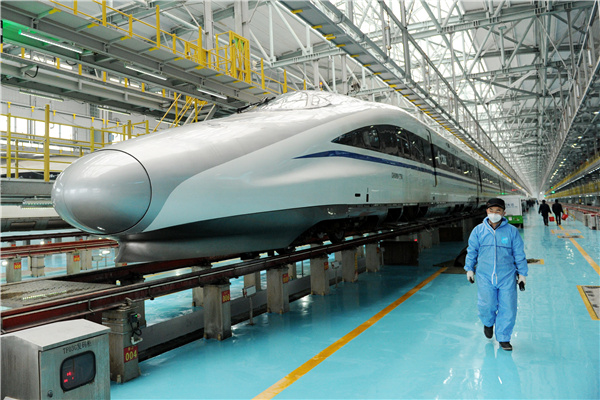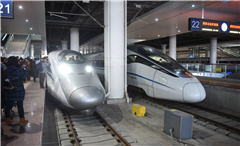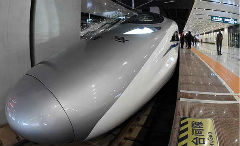$500b to boost high-speed rail plan
2016-12-30
China Daily
 A bullet train is under maintenance in Guiyang, Guizhou province, before operation of the Shanghai-Kunming rail line on Dec 28.[Photo/Xinhua]
A bullet train is under maintenance in Guiyang, Guizhou province, before operation of the Shanghai-Kunming rail line on Dec 28.[Photo/Xinhua]
In the next five years, China will invest 3.5 trillion yuan ($503 billion) to accelerate railway construction, including expansion of the country’s high-speed rail network to 30,000 kilometers, a senior official said on Dec 29.
“By 2020, more than 80 percent of China’s major cities will be connected by high-speed railways,” said Yang Yudong, vice-minister of transportation.
China released a white paper titled “Development of China’s Transport” on Dec 29, which Hu Kaihong, director of the State Council Information Office’s Press Bureau, said is the first white paper to review the sector’s tremendous changes in recent decades and to set goals for its future.
In the past few years, China’s railway network, especially high-speed rail, has undergone dramatic change. From 2011 to 2015, China invested 3.58 trillion yuan to build 30,000 km of railway. By the end of this year, the nation’s total railway length will reach 124,000 km, including 20,000 km of high-speed railway, accounting for 65 percent of the world’s total.
In July, the National Development and Reform Commission issued an updated national railway development plan envisioning a 175,000-km rail network by the end of 2025, with 38,000 km of high-speed rail.
However, the high-speed railway network still faces challenges, especially in the less-developed western part of China. Yang, the vice-minister of transportation, said he is confident that lines in western China will eventually become profitable.
“Plus, building high-speed railway in less-developed regions is not only about recouping investment. It is part of the big project of rejuvenating the whole region and the country’s economy,” said Yang.
The high-speed rail linking Beijing and Shanghai showed a profit last year, Xinhua News Agency reported in July, quoting Tianjin Railway Construction Co, a shareholder of Beijing-Shanghai High-Speed Railway Co.
Yang Hao, a professor of rail transportation at Beijing Jiaotong University, said the economic returns of a high-speed railway network shouldn’t be judged solely on whether lines are profitable, since these railways can leverage the development of such industries as tourism, logistics and real estate.
According to China Railway Corp, construction began on Dec 29 on a high-speed rail line linking Guiyang, Guizhou province-a transportation hub connecting members of the Association of Southeast Asian Nations-and Nanning, the capital of the Guangxi Zhuang autonomous region.
The 482-km line will connect the Shanghai-Kunming railway and the Chengdu-Guiyang railway to the north, and will also link to southern coastal areas including Hainan province and Guangzhou, Guangdong province.
The new railway will accelerate communication between China and ASEAN countries and play an important role in the Belt and Road Initiative.



